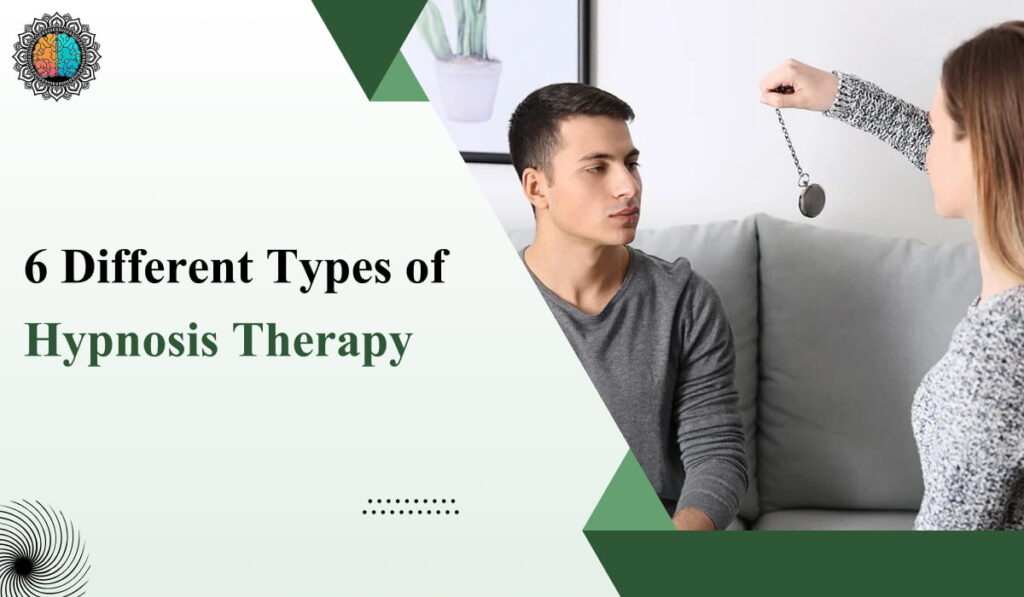
Hypnosis is a widely used form of therapy that assists individuals with various issues. However, there is a common misconception among people, that that one type of hypnosis is used to address all problems, which is far from the truth..
Hypnotherapy is a vast and diverse field encompassing various methods that address different needs. This blog will introduce you to some of the main types of hypnosis techniques and approaches to hypnotherapy. This will give you a better understanding of how each method can support your specific goals and healing journey.
Let’s keep reading to find out about it and choose the right form of therapy for your personalized needs.
This is the most widely used and well-known approach. It consists of guiding the clients to a relaxed state of mind where they become more receptive and give direct suggestions for the change in the individual’s attitudes, ideas, or behaviors.
This approach is beneficial for those who have naturally higher levels of suggestibility. For others, it is useful when combined with other styles of hypnotherapy. It is important to understand that everyone is hypnotizable, it only takes careful evaluation of clients and choosing the right form of hypnotherapy to enhance the likelihood of success!
Traditional hypnosis is effective for a wide variety of issues. This is an excellent option for folks who want general personal development, change a subconscious habit, or need help with weight loss, smoking cessation, or something similar.
Ericksonian Hypnosis, named after Milton Erickson (considered the father of modern hypnosis), is a form of hypnosis that uses indirect suggestions, metaphors, and stories to induce trance and create a change at a subconscious level.
Ericksonian hypnosis is a gentle, natural method that uses the unconscious mind to help you change the way you feel, think, and act.
This method works on the assumption that you are less likely to reject indirect recommendations, which can facilitate your ability to take them in and process them more thoroughly. It provides a more natural way of encouraging change and heavily depends on your subconscious. This kind of hypnosis is especially helpful for people who don’t believe in conventional hypnosis.
As the term implies, clinical hypnotherapy is the application of hypnotic techniques in a clinical setting to treat a range of medical and psychological issues. But, while choosing a clinical hypnotherapist – you need to make sure that they have a governing body registration, comprehensive insurance, recognized qualifications, and extensive experience with clinical hypnotists.
Practiced by licensed healthcare professionals, clinical hypnosis is used to treat a wide range of medical and psychological conditions, including chronic pain, anxiety disorders, depression, and gastrointestinal issues. It is used as part of a broader therapeutic or medical treatment plan.
In regression hypnosis, your hypnotherapist will take you back in time to discover the cause of a problem or issue that is currently bothering you.
The goal is to help clients explore past life events that may be influencing their current emotional, mental, or physical well-being. By revisiting these past experiences, individuals may gain insights into unresolved issues, traumas, or recurring patterns in their present lives.
This type of therapy also poses some risks to developing false memories or experiencing emotional distress. I prefer to utilize other forms of therapy to release the emotional pain associated with past events rather than regressing to the actual event.
Cognitive-behavioral hypnosis (CBH) is a hypnosis approach that uses a range of strategies to help you change your beliefs and behavior. It is based mainly on Cognitive-Behavioral Therapy (CBT).
There is debate in the hypnotherapy field about its exact definition and nature, as it shares numerous similarities with other types of hypnosis therapy. However, there are noticeable differences.
This type of hypnotherapy makes use of a variety of psychological tools and elements, including conceptualization, suggestion, and imagination, that help individuals comprehend the problems and work toward resolution.
In these circumstances, specific issues such as addictions, anxiety, or pain are typically addressed. It enables the creation of a shift in fundamental beliefs when paired with imagination.
NLP, or neuro-linguistic programming, was developed based on Ericksonian hypnosis and gained popularity in the business world in the last few decades. The founders of NLP, Richard Bandler, and John Grinder, examined the work of hypnotists such as Erickson in an attempt to distill the secret of their methods’ potency.
The outcome is NLP. This method of hypnotherapy is independent even though it is based on hypnosis. Practitioners use procedures outside of a formal hypnotic state, sometimes in crowded settings like airports and conference rooms.
NLP changes the mechanisms by which our brains generate experiences. Our brains encode information through sights, sounds, and emotions. Through altering the fundamental components of these encounters, NLP has the power to modify our perception of life’s events.
However, this amazing hypnotherapy method affects more than simply thinking. NLP practitioners have helped people overcome phobias, learning impairments, sorrow, and other issues.
Here’s the wrap of 6 different types of hypnosis therapy you should know about. So, understand your problem and choose the right type of hypnosis.
I would suggest reaching out to an experienced hypnotist – who can help you choose the right type of hypnosis therapy and curate the personalized session to address your pain points.
To make your search easier, I can help you out. I am Jigeesha Pandya at ManahSculpt, a certified hypnotherapist in California. I specialize in different forms of hypnosis therapy and can offer personalized sessions to provide you with the results you are looking for.
So, what are you waiting for? Book a free consultation now & get started right away.
Jigeesha Pandya is a Certified Hypnotherapist and Reiki Practitioner. With a background in climate change research, she shifted her focus to hypnotherapy, studying at the renowned Hypnosis and Motivation Institute in Los Angeles. Jigeesha is passionate about helping individuals harness the power of the subconscious mind for healing and growth.
